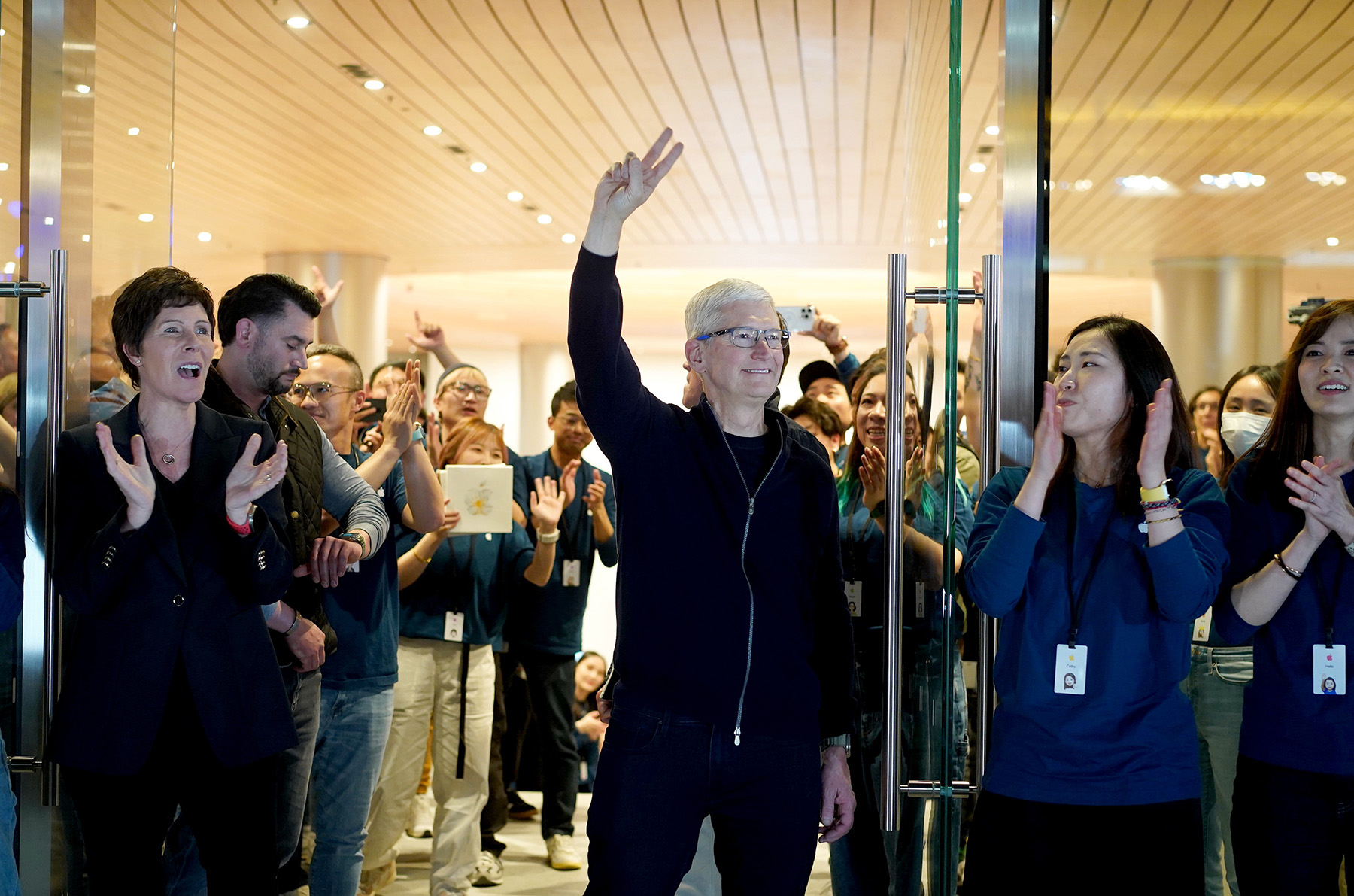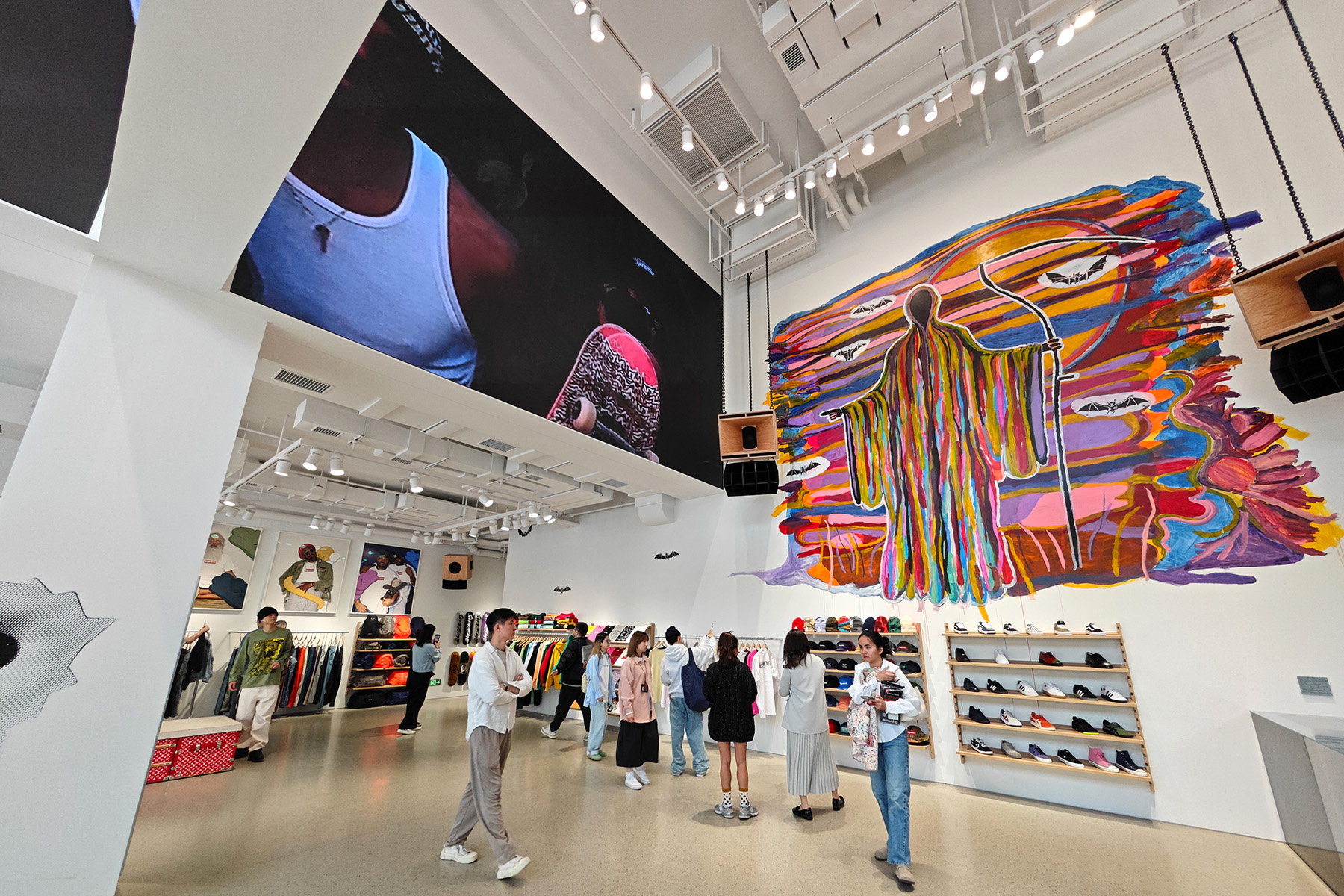More first stores, debut shows from global trademarks are order of the day

A raft of global brands have opened new outlets in Shanghai or made their first-store debuts here of late, attracted by the strong traction seen in the city's retail space.
This follows increased confidence in the Chinese market from foreign investors, as the nation commits to embracing the world with open arms, according to senior executives, experts and officials.
For years, Shanghai has led Chinese cities in housing the greatest number of first stores at various levels, and the trend picked up pace in March.
Among all the first stores and debuts recently, Apple's newly launched flagship, which directly faces the landmark Jing'an Temple in the heart of the city's Jing'an district, has caught the most attention.
The store, its eighth in Shanghai and 47th on the Chinese mainland, was thrown open on March 21, marking the latest attempt by the US tech giant to ramp up sales in the world's second-largest economy.
Tim Cook, CEO of Apple Inc, showed up on the opening night, greeting long lines of Chinese consumers who had been waiting for hours to be among the first to enter the store.
Apple said the new store is encircled by a plaza that gives the community a gathering place for special events, as well as providing a one-of-a-kind shopping destination where customers can discover and buy the iPhone maker's lineup of products and services.
The same night, merely a few blocks away along the city's landmark high street West Nanjing Road, Loewe unveiled its first public exhibition Crafted World at the Shanghai Exhibition Center.
"This is the very first exhibition presented by the Spanish fashion house throughout its 178-year history," said Andrew Wu, president of China for LVMH Group, which has acquired the brand.
According to Wu, the Chinese market is of great importance, and a growing number of Chinese consumers have become fond of quality products.
"What is equally important is the fact that the Yangtze River Delta region has a group of people who appreciate the quality of life, and Shanghai is one of the international fashion highlands," said Wu.
It took two years to prepare for the exhibition that will run from March 22 through May 5.
"The new Apple flagship store and the Loewe exhibition, in my opinion, represent the eagerness of various brands to cement their positions in China," said Liu Min, deputy director of the Shanghai Municipal Commission of Commerce, adding that three debut shows by international brands were staged along the West Nanjing Road that day.
The third event was by US coffee chain operator Starbucks, which debuted its first batch of Oleato beverages, blending coffee with olive oil for the Chinese market.
Howard Schultz, Starbucks founder and chairman emeritus, was at the launch held at the Starbucks Reserve Shanghai Roastery, where he shared a story about the drink with Chinese customers and partners.
Leveraging a combination of global coffee expertise and local insights, Starbucks has high expectations for the new beverages market in China, according to the company.
Jiang Qingyun, a professor of marketing with the School of Management at Fudan University, said debuts of various stores and activities by globally well-known brands indicate the great growth potential of Shanghai and the Chinese market.
China's economic growth has weathered the effects of global economic headwinds and the COVID-19 pandemic, and the diversity of the Chinese market allows various brands to find sizable target customers in their specific market, Jiang said.
Another firm that has increased its presence in China is New York-based skateboard brand Supreme, which opened its 17th store worldwide and one of the largest to date in Shanghai on March 23. The store is located in one of the most stylish areas in the city, on Fumin Road in Xuhui district.
Having a tradition of launching limited items at a specific store, Supreme launched Supreme Shanghai box logo T-shirts and hoodies on the opening day, which were sold out within two and a half days.
Li Jiahang, a senior middle school student, was desperate to buy the limited edition products, although the shirt was retailing for 525 yuan ($72.5) and the hoodie for 1,750 yuan.
"I have liked Supreme since junior middle school, and with the support of my parents, I will buy something I really like," said Li, who had come all the way from his hometown in Jiaxing, Zhejiang province.

Global consumption hub
As the city builds itself into an international consumption hub, a rising number of first stores, debut shows and exhibitions are flocking in, and the roster includes both topnotch global trademarks and local up-and-coming brands, according to the SMCC.
Shanghai has been actively introducing big-name brands and their latest products in recent years, and these efforts will help enhance the city's commercial vitality, creating conditions for attracting more first stores and debuts at various levels, said Liu of the SMCC.
"Shanghai has published the seventh edition of an action plan for creating a first-class business environment, and such a spirit is also applicable to serving global brands," said Liu.
Shanghai has become the first destination for many international brands entering the Chinese market, and 1,215 first stores were opened across the city in 2023, according to official data from the municipal government.
"Apparently, the local government's efforts in supporting consumption and developing Shanghai into a global consumption hub over the past few years have started to take effect," said Jiang.
Shanghai's optimal business environment and complete infrastructure, enriched cityscape and scenic spots, outstanding cultural tourism, diversified and inclusive city-style culture, as well as high-quality customers and abundant business talent, all have contributed to the city's charm for global brands, Jiang added.
"Looking forward, Shanghai, as one of the world's largest port cities, will surely be an important hub for the nation's dual circulation development pattern, in which the domestic economy is the mainstay and the domestic and international economies complement each other," Jiang said.
Specifically, internal circulation is in need of a self-driven domestic industrial chain, and external circulation requires the foundation and capability to embed itself into the global industrial chain. To get there, Shanghai should become the hub, Jiang explained.
Apple Inc's decision to expand in China with new applied research labs is mainly driven by the country's manufacturing, and research and development prowess to make the best products.
Isabel Ge Mahe, vice-president and managing director of Apple Greater China, told China Daily: "We have already invested 1 billion yuan into an applied research lab in China. And with the new expansion plan, our investment will continue growing."
The US tech company is enhancing the capabilities of its Shanghai applied research lab to support the reliability, quality and material analysis of its product lines, she said.
"We chose to have the two labs in China because of the country's manufacturing prowess and local suppliers' strong presence," she said.
Swedish home furnishings giant Ikea is one of several other multinational companies that are thinking of opening stores in Shanghai.
On April 1, the furnishings and housewares brand announced through its official account on Shanghai-based video and photo-sharing app Xiaohongshu that the world's first Ikea boutique store will open in the city soon.
"It is a natural decision for global brands to choose Shanghai as the first destination for entering the Chinese market, especially for consumer brands. For multinational trademarks, Shanghai is the undisputed bridgehead and a landmark city," said Jiang.
Ma Si in Beijing and Liu Kexin in Shanghai contributed to this story.


